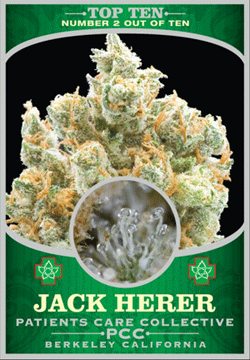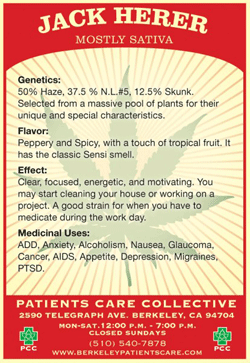 Barry Bonds and A-Rod aren’t the only heavy hitters who’ve got a trading card following. A Berkeley medical pot dispensary has released an attractive set of cards that allows stoners to compare high-scoring ganja varietals such as Afghani Goo and Grand Daddy Purple.
Barry Bonds and A-Rod aren’t the only heavy hitters who’ve got a trading card following. A Berkeley medical pot dispensary has released an attractive set of cards that allows stoners to compare high-scoring ganja varietals such as Afghani Goo and Grand Daddy Purple.
The trading cards idea “was really just like an evolution of the labeling system,” says David Bowers, a manager at the Patient’s Care Collective, a 10-year-old pot store on Telegraph Avenue. Introduced in March, the cards feature glossy photos of killer buds along with details about their defining traits and medical uses. A 10-pack sells for $7.
Of course, unlike standard medical marijuana cards, the trading-card versions don’t give their holders the legal right to purchase pot. But anyone in the market for a nickel bag of funk might consult them to learn about the increasingly sophisticated effects and flavors of California’s designer weed. Grand Daddy Purple has a “rich fruity and sweet scent like grape pixie sticks” and is “very relaxing and good for sleeping.” While the laid-back crowd might best avoid OG Kush, an “extremely pungent and skunky” plant that has psychoactive effects that “can be almost too strong for some patients.”
Many of the cards read like a cross between a wine label and a bottle of Asprin, reflecting marijuana’s double-edged allure as a medicine and agent of hedonism. (California voters will get a chance to legalize recreational marijuana in November). The Jack Herer variety, named after a leading pot activist, is “peppery and spicy, with a touch of tropical  fruit.” It’s also “clear, focused, energetic and motivating . . . A good strain for when you have to medicate during the work day.”
fruit.” It’s also “clear, focused, energetic and motivating . . . A good strain for when you have to medicate during the work day.”
Critics consider marijuana cards to be the reefer version of tobacco company R.J. Reynold’s Joe Camel. “Using slick, full-color cards to glamorize marijuana is an overtly cynical attempt to promote marijuana use to children while turning a profit for yourself,” former California Attorney General Dan Lungren wrote along with 21 other state AGs in a 1998 letter to the now-defunct, San Francisco-based In-Line Trading Cards and Magazines, which had produced a set of “Hemp Cards” that were sold in retail stores. Bowers says that the Patient Care Collective only sells its cards at the dispensary and marijuana trade shows.













